[From the Scene] At Expo Dubai, a journey through Korea’s present, future
By Jo He-rimPublished : Oct. 4, 2021 - 12:52
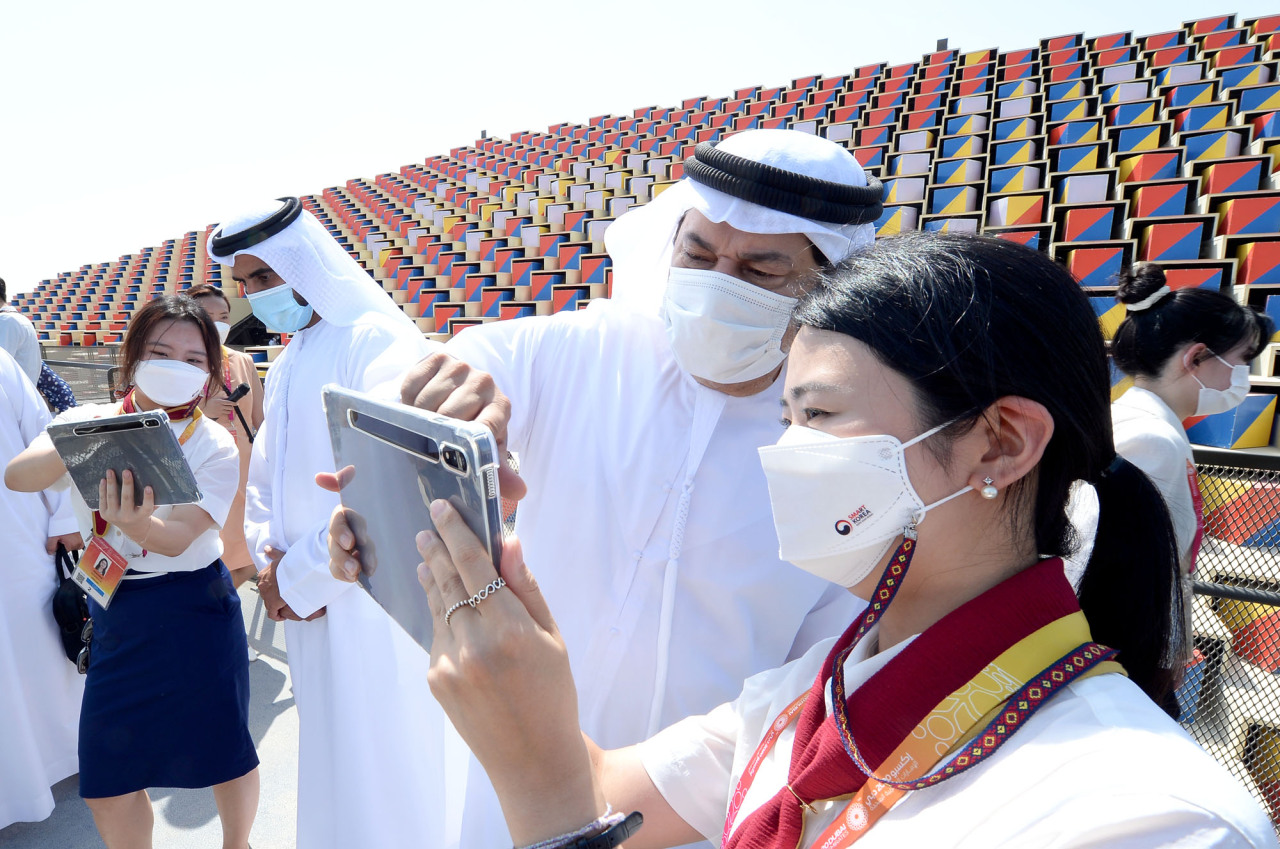
DUBAI, United Arab Emirates -- The Korea Pavilion at the pandemic-delayed Expo 2020 Dubai finally opened Friday, taking visitors on a journey of the present and future of Korea.
The fifth-largest exhibition site at the fair, which was the world’s largest event since the global virus crisis, the Korea exhibit dazzled visitors with 1,597 colorful, rotating cubes mounted outside the building in what is meant to represent the dynamism of its culture and people.
Inside, a plethora of advanced mobility technologies, exciting cultural performances and exhibitions offered a glimpse into the smart city of the future that the country envisions, under the theme “Smart Korea, Moving the World to you.”
On the first day of the pavilion’s six-month run, over 3,230 people -- all vaccinated or tested negative for the coronavirus -- visited, according to the Korea Trade-Investment Promotion Agency, the state trade facilitator which organized the Korean show.
People of different nationalities lined up in front of the pavilion, braving Dubai’s scorching temperatures that climbed up to 40 degrees Celsius at its peak.
The expo itself drew a total of about 53,000 visitors on the first day. With 192 nations participating, it was the biggest of all expos so far, and the first held in the Middle East and Africa region.
Located in the Mobility zone, the Korea Pavilion stood out, not only for its sheer size occupying 4,651 square meters, but also for its unique exterior, with the color-changing triangular roof.
The fifth-largest exhibition site at the fair, which was the world’s largest event since the global virus crisis, the Korea exhibit dazzled visitors with 1,597 colorful, rotating cubes mounted outside the building in what is meant to represent the dynamism of its culture and people.
Inside, a plethora of advanced mobility technologies, exciting cultural performances and exhibitions offered a glimpse into the smart city of the future that the country envisions, under the theme “Smart Korea, Moving the World to you.”
On the first day of the pavilion’s six-month run, over 3,230 people -- all vaccinated or tested negative for the coronavirus -- visited, according to the Korea Trade-Investment Promotion Agency, the state trade facilitator which organized the Korean show.
People of different nationalities lined up in front of the pavilion, braving Dubai’s scorching temperatures that climbed up to 40 degrees Celsius at its peak.
The expo itself drew a total of about 53,000 visitors on the first day. With 192 nations participating, it was the biggest of all expos so far, and the first held in the Middle East and Africa region.
Located in the Mobility zone, the Korea Pavilion stood out, not only for its sheer size occupying 4,651 square meters, but also for its unique exterior, with the color-changing triangular roof.
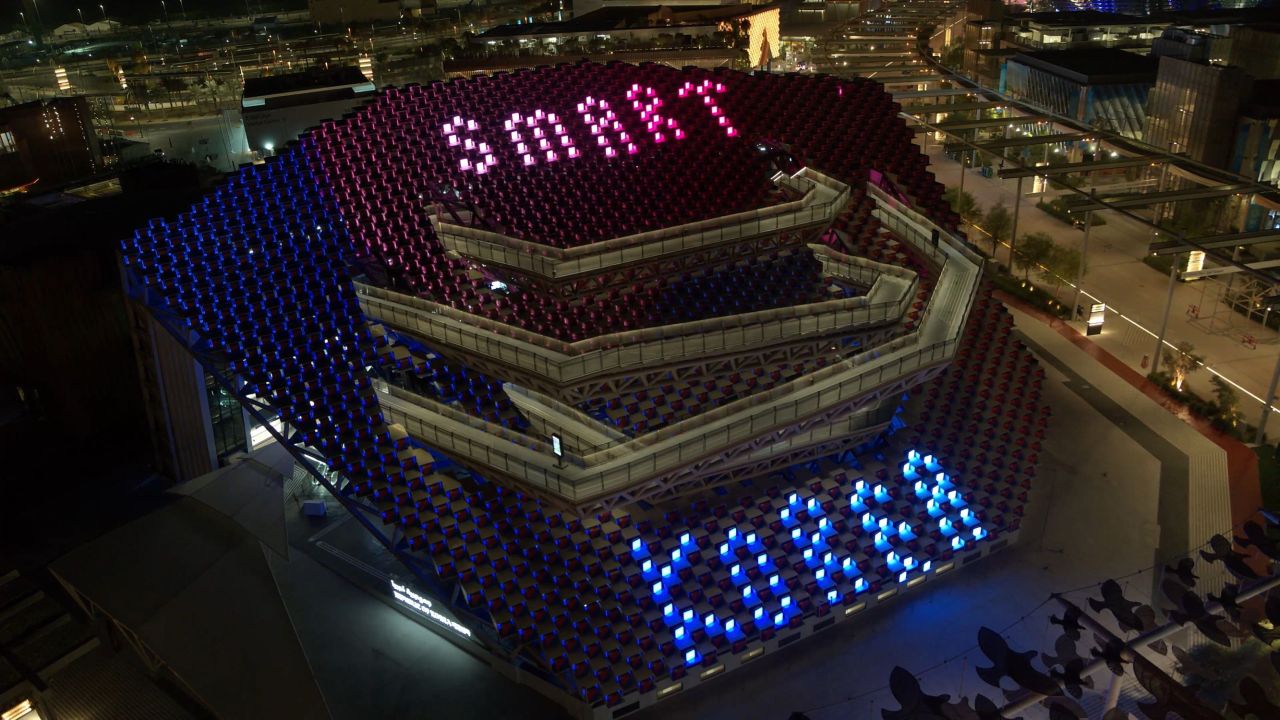
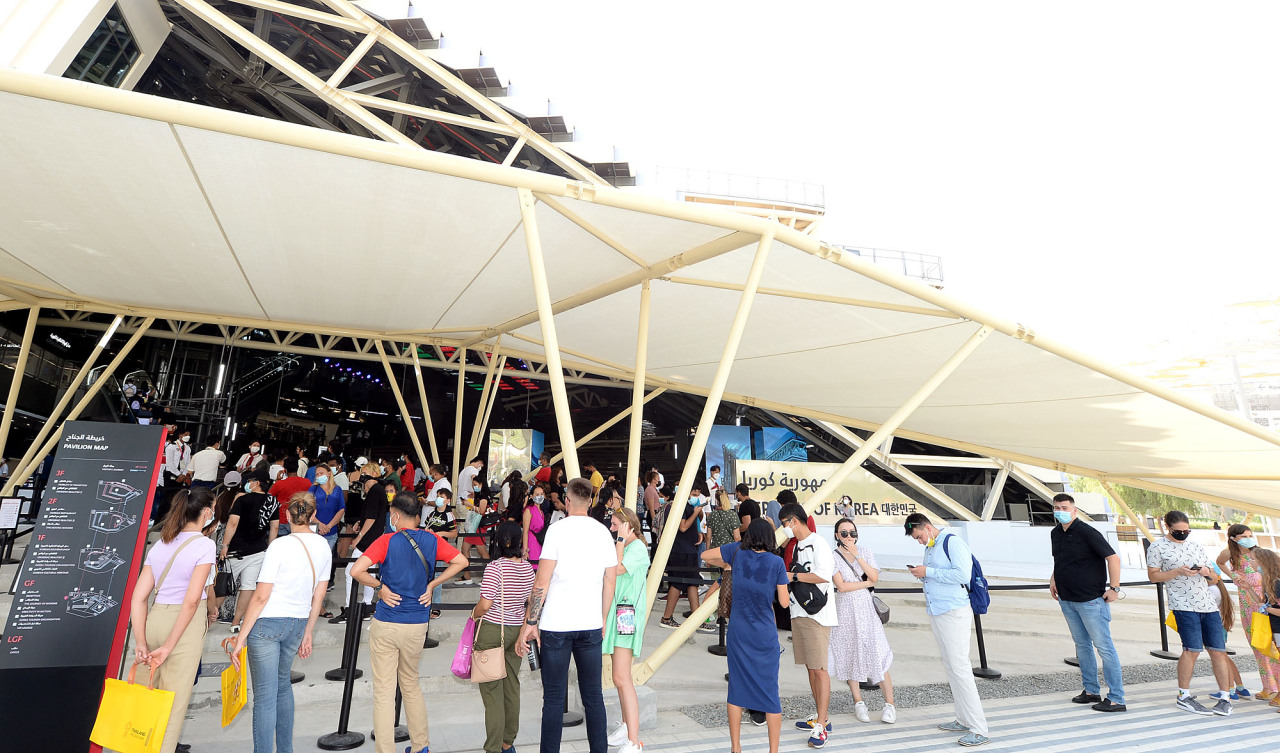
The two other zones at the Dubai Expo were Opportunity and Sustainability, set under the grand theme of “Connecting Minds, Creating the Future.”
The pavilion itself was designed to be an exhibition item, the architect said.
“I wanted to create a structure that is like a tent in a desert, opened so that the sky can be seen and natural breeze could flow in and out,” Moon Hoon from Mooyuki Architects said, explaining why the pavilion did not have air conditioning.
He said the content of the exhibit, many of them taking the form of virtual reality, also match the idea of a mirage in the desert.
Moon’s company won the expo project via a design contest, with the design concept of “Mobile Mass_ity,” an integration of mass, mobility and city. SsangYong Engineering and Construction was in charge of the construction.
Inside, the pavilion took visitors on an exciting journey to Korea, and the future it envisions, showcasing its most up-to-date technologies, such as artificial intelligence and augmented reality, and other cultural content.
At the start of the tour on the first floor, all visitors were given a mobile device to take a selfie to generate a virtual avatar by using face recognition technology.
“It feels very creative, I think,” Clavissa Godula, who came from Austria, told The Korea Herald.
“It was quite hot outside (on the ramp of the exhibition) but I liked how they had the (mobile) device to make our own (tour) guide.”
The pavilion itself was designed to be an exhibition item, the architect said.
“I wanted to create a structure that is like a tent in a desert, opened so that the sky can be seen and natural breeze could flow in and out,” Moon Hoon from Mooyuki Architects said, explaining why the pavilion did not have air conditioning.
He said the content of the exhibit, many of them taking the form of virtual reality, also match the idea of a mirage in the desert.
Moon’s company won the expo project via a design contest, with the design concept of “Mobile Mass_ity,” an integration of mass, mobility and city. SsangYong Engineering and Construction was in charge of the construction.
Inside, the pavilion took visitors on an exciting journey to Korea, and the future it envisions, showcasing its most up-to-date technologies, such as artificial intelligence and augmented reality, and other cultural content.
At the start of the tour on the first floor, all visitors were given a mobile device to take a selfie to generate a virtual avatar by using face recognition technology.
“It feels very creative, I think,” Clavissa Godula, who came from Austria, told The Korea Herald.
“It was quite hot outside (on the ramp of the exhibition) but I liked how they had the (mobile) device to make our own (tour) guide.”
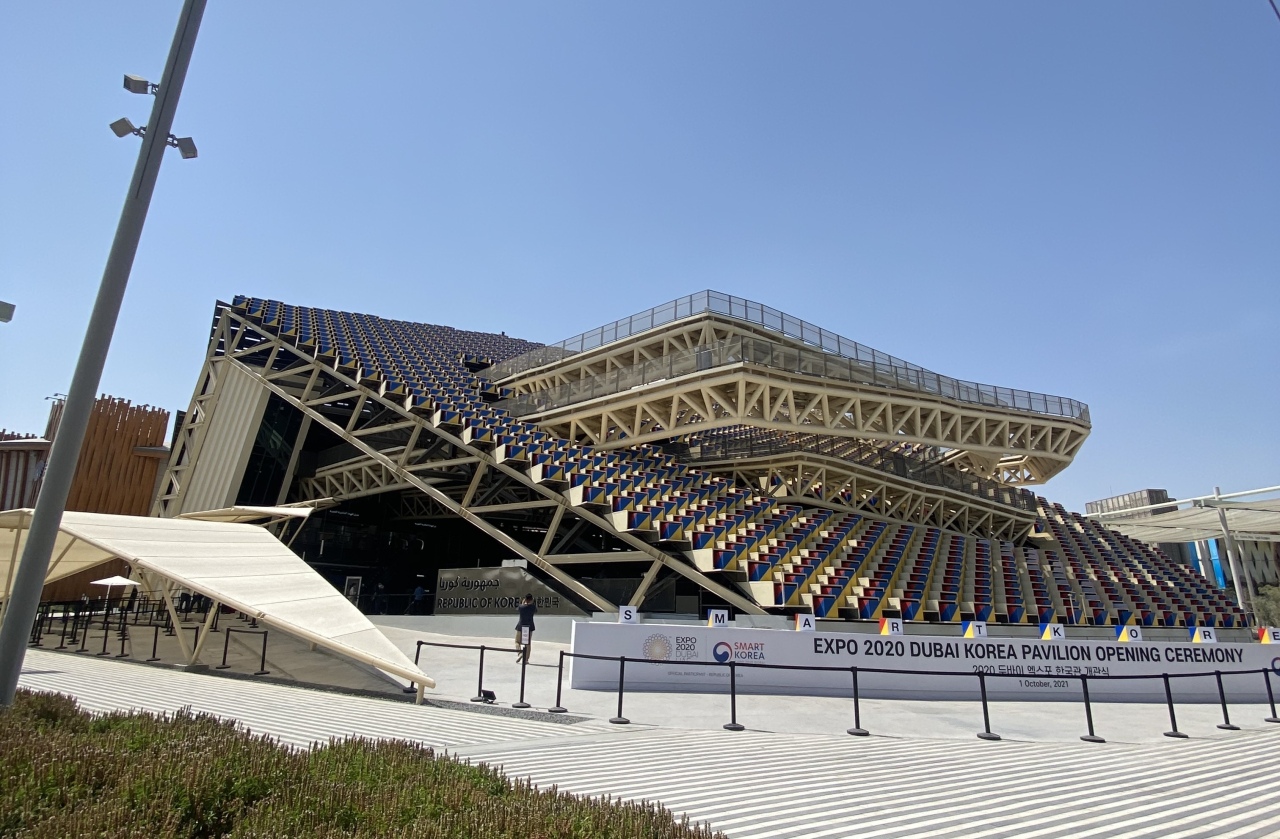
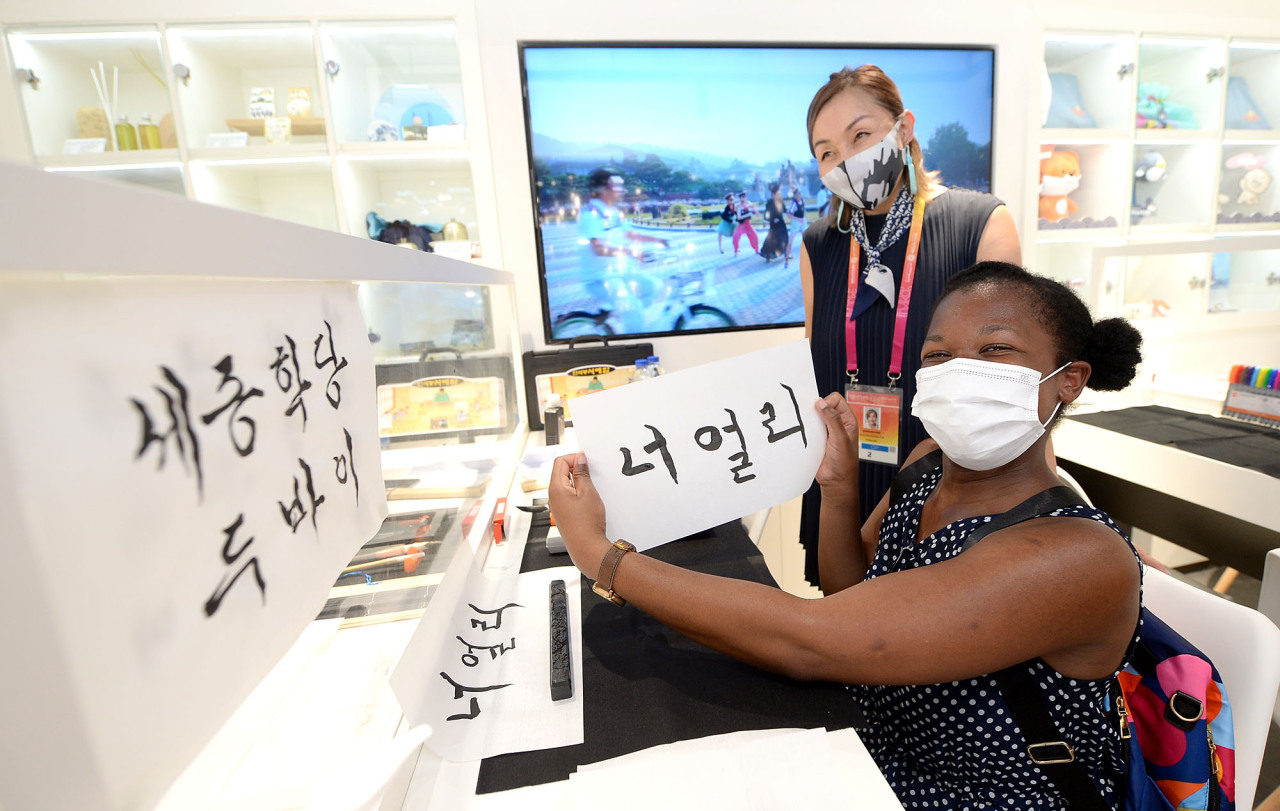
The ramp spirals around in and out of the pavilion to connect the four floors of the pavilion.
Reaching the third floor, an impressive split-flap display called “Flap Vision” welcomed visitors.
Inspired from the analog timetable showing departures and arrivals at train stations and airports, the Flap Vision depicts how mobility has evolved from analog to digital.
Following the trail out to the external ramps, the AR program offered a peek into a virtual city built on smart infrastructure technologies by Korean companies.
By scanning the image markers installed on the handrails, graphic images of a virtual city, Hyundai Motor’s hydrogen-fueled electric vehicles and green energy infrastructures by GS Caltex, popped up on the mobile device.
Using the AR program on their mobile devices, visitors were also able to see Hyundai’s urban air mobility vehicle flying virtually in the Dubai skies.
Back inside the pavilion, the device led to the “Vertical Cinema,” which consisted of a mega screen that stretched vertically to fill one side of the wall and connects to the ceiling. Visitors lay down on beanbags to watch a 7-minute video, taking them on a virtual trip to Korea.
Named as “the Journey of Wonder,” the video presented a colorful and dynamic picture of Korean culture, lifestyle and advanced technologies.
“My favorite part was the video, to lie down and watch. I’ve been to Seoul before so I was excited to see the places that I have been to before,” Godula from Austria said.
Reaching the third floor, an impressive split-flap display called “Flap Vision” welcomed visitors.
Inspired from the analog timetable showing departures and arrivals at train stations and airports, the Flap Vision depicts how mobility has evolved from analog to digital.
Following the trail out to the external ramps, the AR program offered a peek into a virtual city built on smart infrastructure technologies by Korean companies.
By scanning the image markers installed on the handrails, graphic images of a virtual city, Hyundai Motor’s hydrogen-fueled electric vehicles and green energy infrastructures by GS Caltex, popped up on the mobile device.
Using the AR program on their mobile devices, visitors were also able to see Hyundai’s urban air mobility vehicle flying virtually in the Dubai skies.
Back inside the pavilion, the device led to the “Vertical Cinema,” which consisted of a mega screen that stretched vertically to fill one side of the wall and connects to the ceiling. Visitors lay down on beanbags to watch a 7-minute video, taking them on a virtual trip to Korea.
Named as “the Journey of Wonder,” the video presented a colorful and dynamic picture of Korean culture, lifestyle and advanced technologies.
“My favorite part was the video, to lie down and watch. I’ve been to Seoul before so I was excited to see the places that I have been to before,” Godula from Austria said.
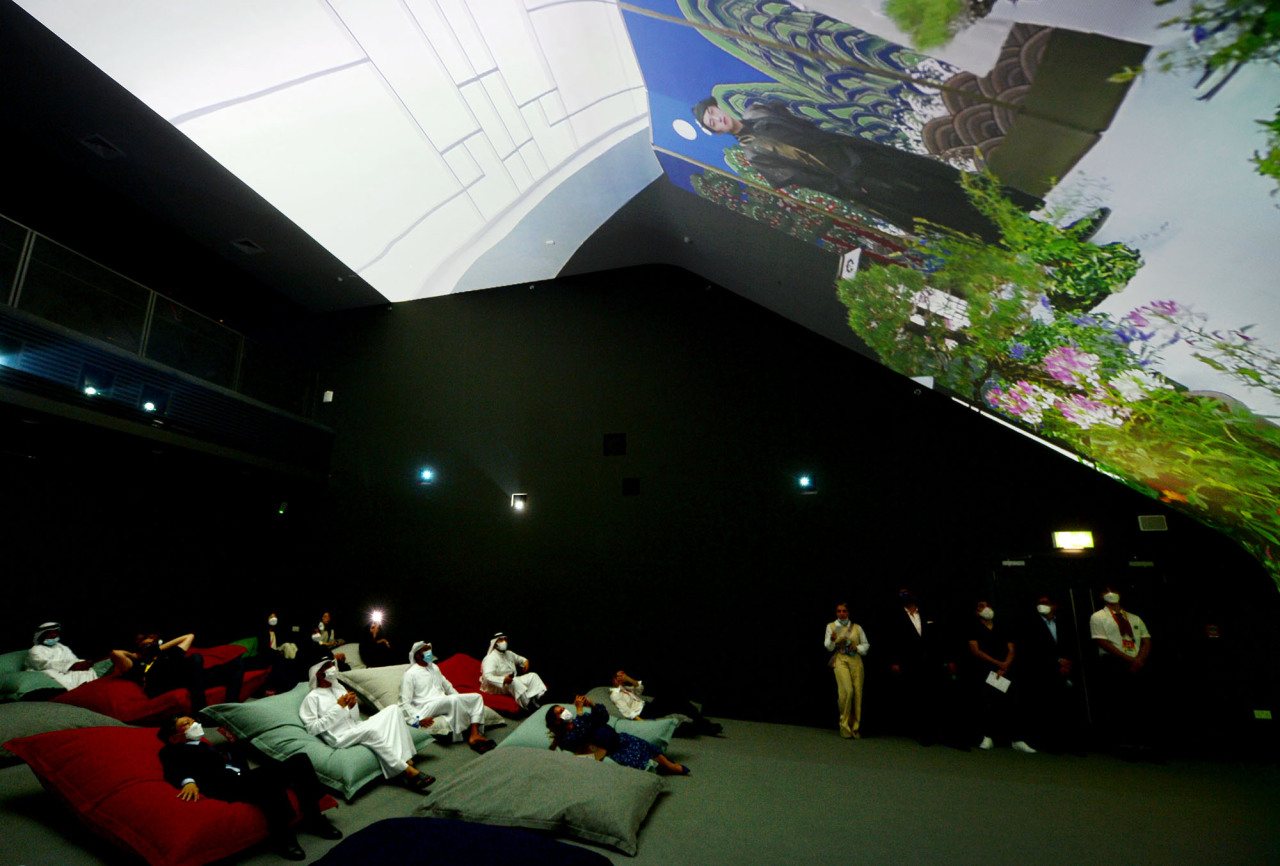
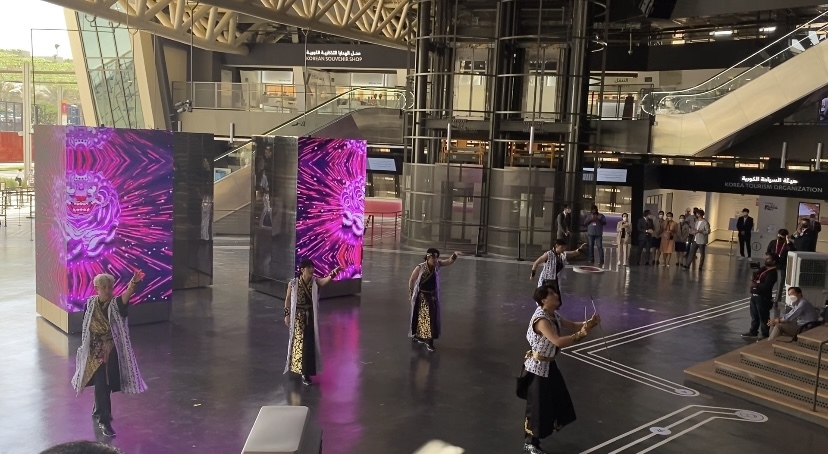
The cinema space was intended to give a virtual tour of Korea to those who have been stuck at home due to the prolonged pandemic, according to CJ ENM, the Korean entertainment and media firm that took part in the content production.
At the Madang, or the open courtyard space in the center of the pavilion, people gathered to watch B-boys perform to K-pop and traditional Korean music, together with “mobile columns.”
These mobile columns, equipped with motion sensors and an autonomous driving system, joined the performers, flashing colorful images and moving together with the dancers to add excitement on the stage.
“We enjoyed the performance,” said Wasmeya Alrashdi, an Emirati visitor. Alrashdi, who is a fan of Korean dramas, also suggested that playing “pansori,” a type of traditional Korean music, would make the stages more fun.
In the six months of operation, the pavilion would have 1,800 cultural performances, holding 10 showcases every day of K-pop music, B-boying and traditional Korean choreography, according to the organizer, Kotra.
For South Korea, the Dubai edition of the World Expo is also an opportunity to promote Busan, the country’s second-largest city that is bidding to host the 2030 event.
“We hope to utilize Dubai Expo as a launchpad for Korea’s bid to host the World Expo 2030 in Busan in close cooperation with the UAE, which has a wealth of know-how and experience not only in having made a successful bid for World Expo but in actual organization and implementation of the world’s biggest event,” said Kwon Yong-woo, ambassador of the Republic of Korea to the UAE.
A Korea Tourism Organization booth was set up at the pavilion to provide information for travelers, and also, to promote Busan.
At the Madang, or the open courtyard space in the center of the pavilion, people gathered to watch B-boys perform to K-pop and traditional Korean music, together with “mobile columns.”
These mobile columns, equipped with motion sensors and an autonomous driving system, joined the performers, flashing colorful images and moving together with the dancers to add excitement on the stage.
“We enjoyed the performance,” said Wasmeya Alrashdi, an Emirati visitor. Alrashdi, who is a fan of Korean dramas, also suggested that playing “pansori,” a type of traditional Korean music, would make the stages more fun.
In the six months of operation, the pavilion would have 1,800 cultural performances, holding 10 showcases every day of K-pop music, B-boying and traditional Korean choreography, according to the organizer, Kotra.
For South Korea, the Dubai edition of the World Expo is also an opportunity to promote Busan, the country’s second-largest city that is bidding to host the 2030 event.
“We hope to utilize Dubai Expo as a launchpad for Korea’s bid to host the World Expo 2030 in Busan in close cooperation with the UAE, which has a wealth of know-how and experience not only in having made a successful bid for World Expo but in actual organization and implementation of the world’s biggest event,” said Kwon Yong-woo, ambassador of the Republic of Korea to the UAE.
A Korea Tourism Organization booth was set up at the pavilion to provide information for travelers, and also, to promote Busan.
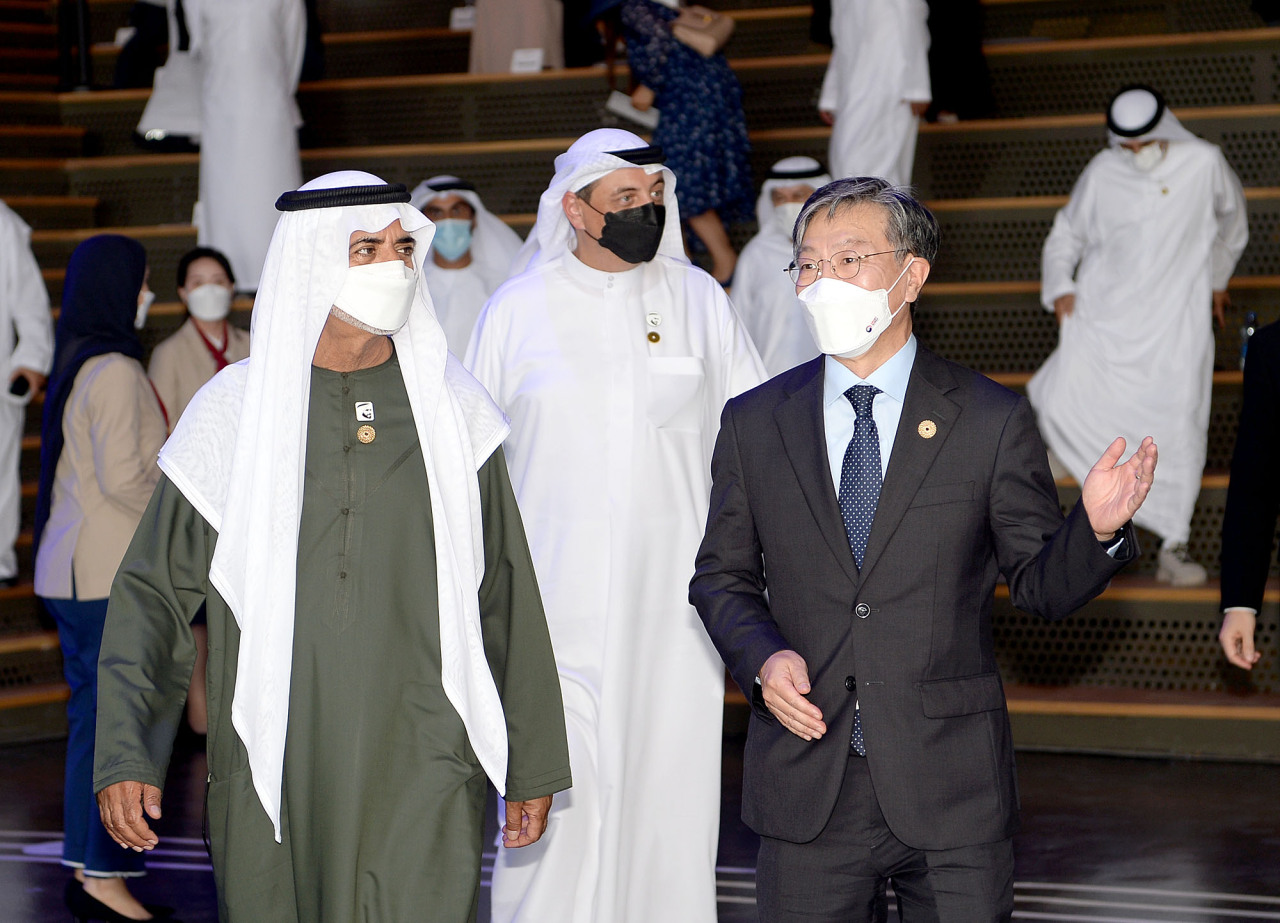
The opening ceremony of the Korea Pavilion on Friday was attended by officials from Kotra and the United Arab Emirates, including Sheikh Nahayan Mabarak Al Nahayan, the UAE minister of tolerance and coexistence and the commissioner general of Expo 2020 Dubai.
“The Korea Pavilion was built based on the motif of a bloomed flower in the desert. With this, we want to show Korean dynamism that brings together individualistic images in harmony regardless of nationality, gender or age” Kotra President and Commissioner General of the Korea Pavilion Yu Jeoung-yeol said during the opening ceremony.
Thani Ahmed al-Zeyoudi, the UAE minister of state for foreign trade, said the opening of the pavilion is a testament to the strong bilateral ties between the UAE and South Korea, and to their shared commitment to connecting the world and driving greater human progress.
“The UAE’s relationship with South Korea is based on a longstanding friendship and partnership, underscored by our deep trade and investment ties. Our collaboration with South Korea has expanded from early cooperation in the energy sector to a broader strategic partnership where many South Korean-made goods now flow into the UAE,” al-Zeyoudi said.
The Korea Pavilion, which is hosted by Ministry of Trade, Industry and Energy of Korea and organized by Kotra, will run until March 31, 2022.
“The Korea Pavilion was built based on the motif of a bloomed flower in the desert. With this, we want to show Korean dynamism that brings together individualistic images in harmony regardless of nationality, gender or age” Kotra President and Commissioner General of the Korea Pavilion Yu Jeoung-yeol said during the opening ceremony.
Thani Ahmed al-Zeyoudi, the UAE minister of state for foreign trade, said the opening of the pavilion is a testament to the strong bilateral ties between the UAE and South Korea, and to their shared commitment to connecting the world and driving greater human progress.
“The UAE’s relationship with South Korea is based on a longstanding friendship and partnership, underscored by our deep trade and investment ties. Our collaboration with South Korea has expanded from early cooperation in the energy sector to a broader strategic partnership where many South Korean-made goods now flow into the UAE,” al-Zeyoudi said.
The Korea Pavilion, which is hosted by Ministry of Trade, Industry and Energy of Korea and organized by Kotra, will run until March 31, 2022.











![[Today’s K-pop] BTS pop-up event to come to Seoul](http://res.heraldm.com/phpwas/restmb_idxmake.php?idx=644&simg=/content/image/2024/04/17/20240417050734_0.jpg&u=)





![[KH Explains] Hyundai's full hybrid edge to pay off amid slow transition to pure EVs](http://res.heraldm.com/phpwas/restmb_idxmake.php?idx=652&simg=/content/image/2024/04/18/20240418050645_0.jpg&u=20240418181020)

![[Today’s K-pop] Zico drops snippet of collaboration with Jennie](http://res.heraldm.com/phpwas/restmb_idxmake.php?idx=642&simg=/content/image/2024/04/18/20240418050702_0.jpg&u=)